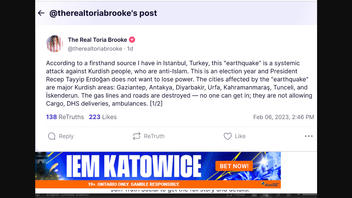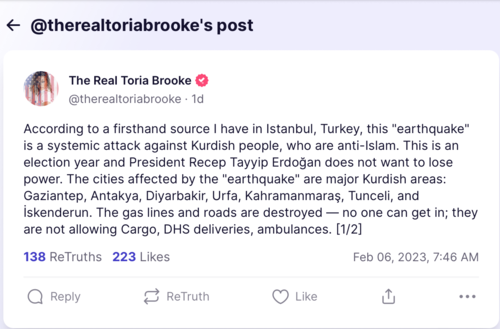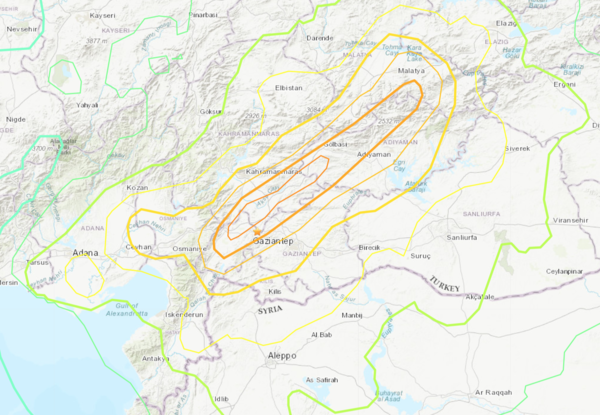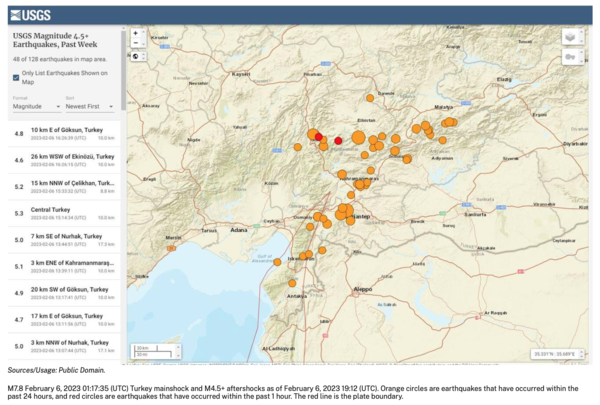
Was the 7.8-magnitude earthquake that rocked southeastern Turkey and parts of Syria on February 6, 2023, fake and actually a planned, politically motivated attack against the Kurdish people in the region? No, that's not true: Seismic activity recorded by earthquake monitors around the world have documented the quake and its numerous aftershocks.
The claim appeared on TruthSocial on February 6, 2023 (archived here). The post said the quake was a "systemic" political attack on the Kurdish people in the region as part of an election year effort to keep Turkish President Recep Tayyip Erdogan in power.
Here's how the post appeared on the day of the writing of this fact check:
(Source: TruthSocial screenshot taken Tue Feb 7 at 16:10:43 2023 UTC)
In reality, seismic centers around the world, including the U.S. Geological Survey (USGS), recorded the quake's strike at 1:17 UTC -- or about 4:17 a.m. local time -- in south central Turkey near the country's border with Syria. The recorded magnitude was 7.8 and was followed about 11 minutes later by a magnitude 6.7 aftershock, according to the USGS and the European-Mediterranean Seismological Centre (EMSC). Further analysis by USGS seismologists indicate the earthquakes and aftershocks are occurring on the East Anatolian fault system.
This USGS map is marked with a star at the earthquake's epicenter in Nurdagi, Turkey, and shows its wide impact across the region:
(Source: USGS event map screenshot taken Tue Feb 7 at 17:11:26 2023 UTC)
According to the USGS, both the initial earthquake and aftershock were relatively shallow. The main shock struck about 11 miles deep and the first aftershock at roughly six miles deep. Shallow earthquakes produce higher-intensity ground shaking.
Data from the EMSC suggest that the magnitide 7.8 earthquake and its initial aftershock have been felt as far as 1,240 miles, or 2,000 kilometers, from the epicenter. Aftershocks continued to be felt well into February 7, 2023, as this USGS map shows:
(Source: USGS aftershock map screenshot taken Feb 7 at 17:55:08 2023 UTC)
Dozens of aftershocks have also been recorded by the Kandilli Observatory and Earthquake Research Institute at Turkey's Bogazici University in Istanbul.
News reports from Turkey say the quake topped thousands of buildings and as of February 7, 2023, at least 7,100 people had reportedly died. A state of emergency had been declared in 10 provinces affected by the quake.
According to the earthquake forecasting center Quantectum, Turkey ranks as "one of the most earthquake-prone regions in the world," with "thousands" of earthquakes each year. Situated between the Eurasian, African and Arabian plates, the country is "being literally squeezed" as the African and Arabian plates shift, Quantectum explains.
Turkey has had four major quakes since 1950, including four at or above a magnitude of 6.9 on the Richter scale; a level that can cause significant damage in built-up areas.
Other Lead Stories fact checks about the Turkey earthquake can be found here.




















